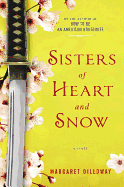
The story of Tomoe Gozen, a 12th-century Japanase onna-musha (the female equivalent of a samurai), who may have been a fictional creation, is woven between the modern conflicts of two semi-estranged sisters in Sisters of Heart and Snow by Margaret Dilloway (How to Be an American Housewife).
Rachel and Drew Snow know how their parents met--their father ordered their Japanese mother, Hikari, from a catalogue in the '70s--but Hikari's life before coming to the United States is a mystery, and now that she has dementia and resides in a nursing home, they expect her past to remain unknown. In a rare clear moment, Hikari asks Rachel to find a book in a closet at home. Because Rachel hasn't been back to her parents' house for two decades--not since her father kicked her out when she was 16--she asks her sister to help look for it. When they find the book, which is in Japanese, neither is able to read it, but because their mother wrote their names in it, they know the book's meant for them. Drew hires a graduate student to translate the book, and the sisters are soon engrossed in the stories of Tomoe Gozen and Yamabuki, "sisters of heart" bound to the same man, trying to decipher their significance to their mother and what message she means for her daughters to take from them.
Dilloway's narrative about Tomoe Gozen doesn't always clearly parallel or reflect the present-day story, but it's an interesting framing device and adds an unexpected dimension to the complicated lives of the Snow sisters. --Florinda Pendley Vasquez, blogger at The 3 R's: Reading, 'Riting, and Randomness

